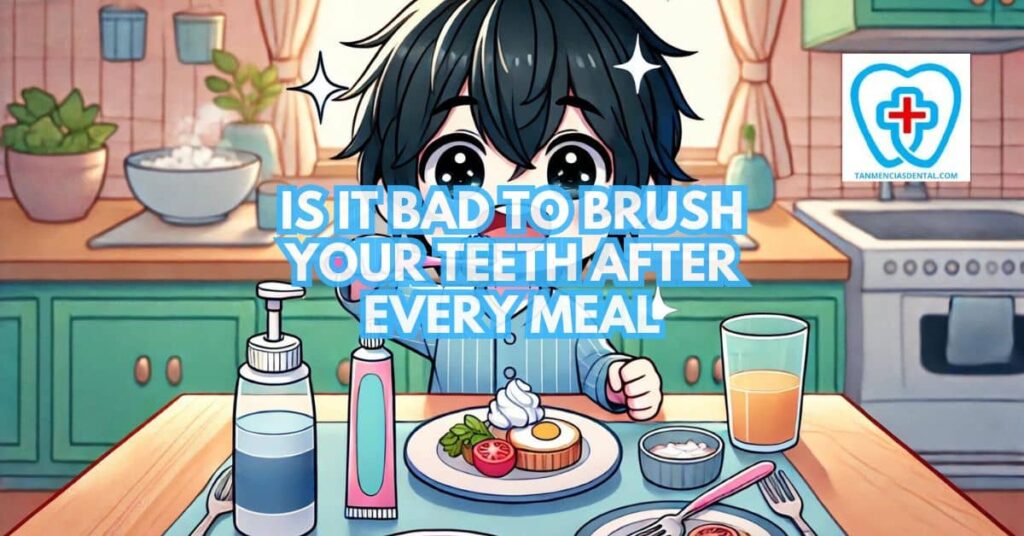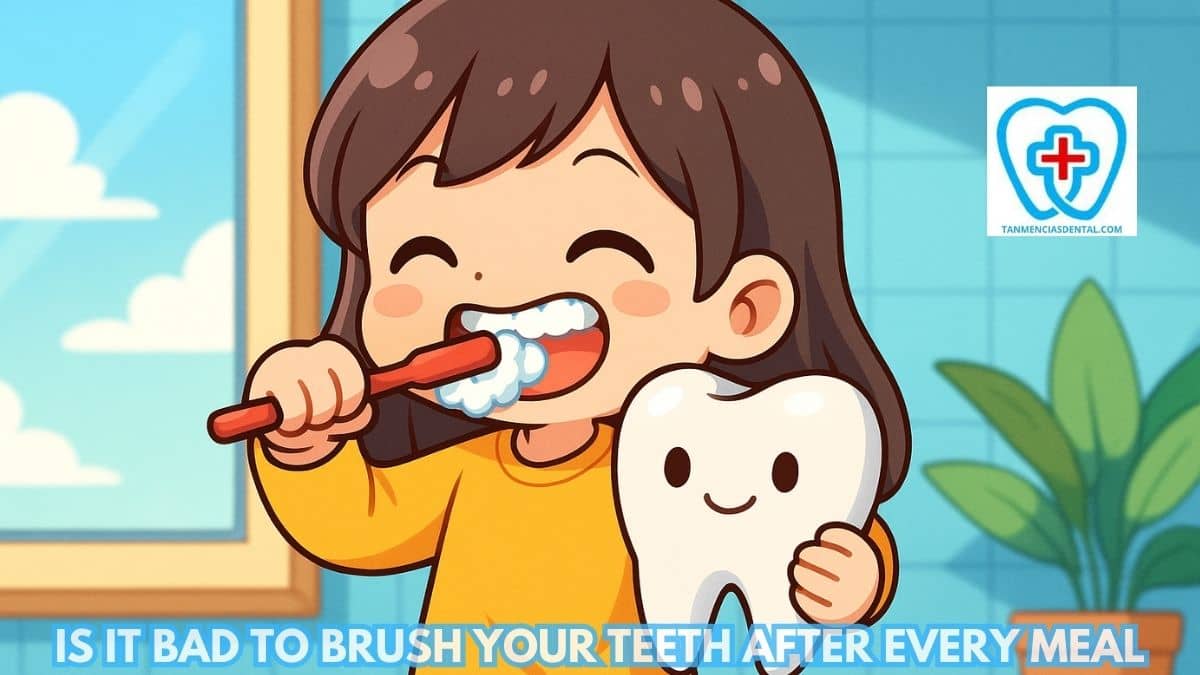Brushing after meals is often seen as the best way to keep your mouth clean, but it is not always safe for your teeth.
The main question many people ask is, Is it bad to brush your teeth after every meal, and the answer depends on timing and food choices.
When you eat acidic foods or drinks, the enamel on your teeth becomes softer for a short time.
Brushing too soon can damage this enamel and increase the risk of long-term erosion.
Learning when and how to brush can make a big difference in keeping your teeth healthy and strong.
1. The Acidic Truth: Enamel’s Enemy
After eating, especially acidic foods like citrus fruits or soda, your tooth enamel becomes softer and more at risk.
This softening happens because acids in certain foods and drinks temporarily weaken the protective surface of your teeth.
When the enamel is softened, it cannot resist brushing as well as it normally does, which makes it easier to wear away.
If you brush right after eating, the motion of the bristles can remove this weakened layer and cause long-term erosion.
It is best to wait at least 30 minutes before brushing so your saliva has time to neutralize the acid and begin repairing the enamel.
During this waiting period, rinsing with water or chewing sugar-free gum can help speed up the natural process of protecting your tooth enamel.
Allowing enough time before brushing keeps your teeth strong and reduces the damage that can come from eating certain foods too often.
🦷 The Connection Between Drinking Alcohol and Gingivitis
2. The Role of Toothpaste: Abrasiveness Matters
The type of toothpaste you use can also impact your enamel.
Some toothpastes are more abrasive than others and are designed to remove stains and plaque more effectively.
While effective, these abrasive toothpastes can also wear down enamel if used too often.
Using a gentle, low-abrasive toothpaste is crucial, especially if you brush frequently, particularly after meals.
This helps maintain the balance between cleaning your teeth and protecting your enamel.
🦷 Can Periodontal Gum Disease Be Reversed?
3. Saliva: Your Mouth’s Natural Protector
Saliva plays a crucial role in maintaining oral health by neutralizing acids and washing away food particles.
It helps restore the natural pH balance in your mouth after eating, reducing the risk of enamel erosion.
Giving your saliva time to work before brushing can help protect your enamel.
Chewing sugar-free gum or rinsing with water can stimulate saliva production, aiding this natural process.
It’s a simple and effective way to maintain oral health without the need for immediate brushing.
🦷 Basic Dental Care Vs Routine Dental Care: What’s the Difference?
4. Timing is Everything: When to Brush
Timing your brushing is key to avoiding enamel erosion.
Dentists recommend waiting at least 30 minutes after meals before brushing.
This waiting period allows saliva to neutralize acids and re-harden your enamel.
Brushing too soon after eating can remove softened enamel, leading to long-term damage.
Proper timing ensures that your teeth are clean without compromising their strength.
🦷 Can Children Use Electric Toothbrushes? Is It Safe and Effective for Them?

5. Erosion vs. Decay: Understanding the Difference
Enamel erosion and tooth decay are different issues, each with unique causes and effects.
Erosion is caused by acids from foods and drinks wearing away the enamel over time.
Decay, on the other hand, results from plaque bacteria producing acids that attack the teeth.
Brushing after every meal can increase the risk of erosion due to frequent exposure to acids.
Understanding these differences helps you adopt the right dental care routine to protect your teeth.
🦷 How to Treat Gingivitis in Toddlers: A Parent’s Guide
6. Rinse and Repeat: The Benefits of Water
Rinsing your mouth with water after meals is a gentle way to clean your teeth.
It helps remove food particles and dilute acids without harming your enamel.
This simple habit can complement your regular brushing routine, especially when you cannot brush immediately.
Water is readily available and can be used anywhere, making it a convenient solution.
Incorporating rinsing into your daily routine can significantly benefit your oral health.
🦷 How Sedation Dentist Procedures Help Patients Overcome Dental Anxiety
7. Chew on This: Sugar-Free Gum’s Role
Chewing sugar-free gum after meals stimulates saliva production.
Increased saliva helps neutralize acids, cleanse your mouth, and strengthen enamel.
Sugar-free gum is a convenient and effective alternative to immediate brushing, especially when you’re on the go.
It can help maintain oral hygiene by reducing the risk of erosion and decay.
Including this simple practice can enhance your dental care routine and protect your teeth.
🦷 How to Keep Your Teeth Clean With Braces: A Helpful Guide
8. Brushing Basics: How Often and When
Brushing twice a day is generally sufficient for most people to maintain good oral health.
It’s recommended to brush once in the morning and once before bed to effectively remove plaque and food particles.
Over-brushing, especially after every meal, can lead to enamel erosion and gum irritation.
Using a soft-bristled toothbrush and gentle, circular motions can help protect your gums and enamel.
A consistent routine with the right technique is key to effective brushing.
🦷 Should I Brush My Teeth Before Using Whitening Strips?
9. Nighttime Brushing Matters Most
Brushing your teeth before going to bed is the most important cleaning of the day.
At night, your mouth makes less saliva, which means acids and bacteria can stay on your teeth longer.
Without this final cleaning, plaque and food particles can sit on your teeth while you sleep.
This buildup raises the risk of cavities, gum problems, and enamel wear.
Making nighttime brushing a steady habit protects your teeth during the hours when they are most at risk.
🦷 Do You Brush Your Teeth After Whitening? Find Out!
10. Professional Care: The Importance of Dental Checkups
Regular dental checkups are essential for maintaining optimal oral health.
Dentists can identify early signs of decay, erosion, or gum disease and provide personalized advice.
Professional cleanings remove plaque and tartar buildup that daily brushing and flossing might miss.
Routine visits also allow dentists to monitor the effectiveness of your brushing habits and suggest improvements.
These checkups are crucial for preventing dental problems and ensuring a healthy smile.
🦷 Orthodontic Treatment in Marikina
11. Eat Smart, Smile Bright: Diet’s Impact on Oral Health
Your diet significantly affects your oral health, influencing the condition of your teeth and gums.
Limiting sugary and acidic foods can reduce the risk of enamel erosion and tooth decay.
Foods rich in calcium, phosphorus, and vitamins support strong teeth and gums.
Drinking plenty of water throughout the day helps rinse away food particles and neutralize acids.
A balanced diet, combined with good dental hygiene practices, promotes overall oral health.
🦷 Marikina’s Trusted Family Dental Care
👨⚕️ Conclusion
Brushing your teeth after every meal isn’t necessarily bad, but it requires careful consideration.
Timing your brushing, understanding the role of saliva, and adopting alternative habits can protect your enamel.
Simple practices, like rinsing with water or chewing sugar-free gum, can be effective alternatives.
Regular dental checkups and a balanced diet also play a significant role in maintaining oral health.
Finding the right balance ensures your teeth stay healthy and strong without risking damage.
😊 Self-Promotion
Visit Tan-Mencias Dental Clinic in Parang, Marikina City, where your smile is our priority.
Our friendly team is ready to provide you with top-notch dental care in a warm and welcoming environment.
For any questions or to schedule an appointment, you can call us at 9171451074, leave a message on our Facebook page, or contact us via our website.
We’re here to ensure your dental health and comfort.
Come experience the difference with Tan-Mencias Dental Clinic today!
❔ FAQs
1. Is it bad to brush your teeth after every meal?
Brushing after every meal can harm your teeth if you do it too soon, especially after eating acidic foods or drinks.
Your enamel softens for a short time, and brushing right away can wear it down.
Dentists recommend waiting at least 30 minutes before brushing.
2. What should I do right after eating if I cannot brush?
Rinse your mouth with water to wash away food particles and acids.
You can also chew sugar-free gum to increase saliva, which helps protect your enamel.
Both are safe and effective alternatives until you can brush.
3. How many times a day should I brush my teeth?
Brushing twice a day is enough for most people.
Once in the morning and once before bed helps remove plaque and protect against cavities.
Brushing more often is not always better and may cause enamel wear or gum problems.
4. Why is brushing before bed so important?
At night, your mouth makes less saliva, so acids and bacteria stay on your teeth longer.
Brushing before bed clears away food and plaque before sleep.
This lowers your risk of cavities and gum disease.
5. Can the type of toothpaste make a difference?
Yes, toothpaste can be gentle or abrasive.
Using a soft, low-abrasive toothpaste protects your enamel if you brush often.
Whitening or heavy-duty pastes may wear enamel faster if used too much.

